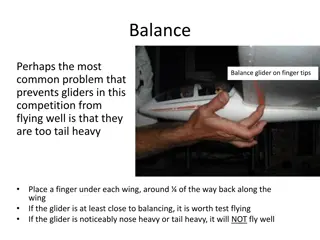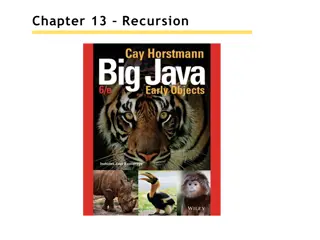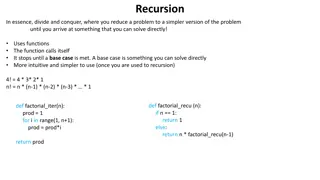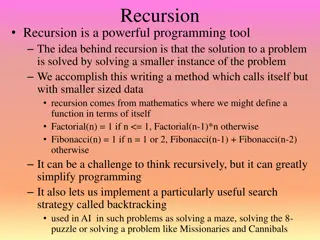
Code Efficiency in Recursive vs. Iterative Functions
Explore the comparison between recursive and iterative functions in terms of memory usage and efficiency. Delve into examples demonstrating how memory allocation and time complexity vary between these programming approaches. Understand the practical implications and considerations for choosing the right method for optimal code performance.
Download Presentation

Please find below an Image/Link to download the presentation.
The content on the website is provided AS IS for your information and personal use only. It may not be sold, licensed, or shared on other websites without obtaining consent from the author. If you encounter any issues during the download, it is possible that the publisher has removed the file from their server.
You are allowed to download the files provided on this website for personal or commercial use, subject to the condition that they are used lawfully. All files are the property of their respective owners.
The content on the website is provided AS IS for your information and personal use only. It may not be sold, licensed, or shared on other websites without obtaining consent from the author.
E N D
Presentation Transcript
CSE 331 Spring 2025 Tail Recursion I Matt Wang xkcd #244 & Ali, Alice, Andrew, Anmol, Antonio, Connor, Edison, Helena, Jonathan, Katherine, Lauren, Lawrence, Mayee, Omar, Riva, Saan, and Yusong
Administrivia (05/09) HW6 is out! note: will quickly wrap up one last Topic 6 example, then move on to Topic 7 this example is very relevant to your HW :) 2
Local Variable Mutation & Memory Use With only straight-line code & conditionals it seems like it saves memory but it does not (compiler would fix anyway) With loops it really does save memory no improvement in running time but loops cannot be used in all cases some problems really do require more memory When can loops be used and when not? 3
Sum of List: Recursive Math vs Iterative Code Recursive function to calculate sum of list sum(nil) sum(x :: L) := 0 := x + sum(L) Recursion can be directly translated into code Loop to calculate sum of a list {{ L = L0 }} let s: bigint = 0n; {{ Inv Inv: sum(L0) = s + sum(L) }} while (L.kind !== "nil") { s = s + L.hd; L = L.tl; } {{ s = sum(L0) }} 4
Sum of List: Recursion vs Loops, in Code Loop Recursion const sum = (L: List): bigint => { {{ L = L0 }} let s: bigint = 0n; {{ Inv Inv: sum(L0) = s + sum(L) }} while (L.kind !== "nil") { s = s + L.hd; L = L.tl; } {{ s = sum(L0) }} if (L.kind === "nil") { return 0n; } else { return L.hd + sum(L.tl); } } Both run in O(n) time where n = len(L) Loop uses O(1)extra memory, but right does not 5
Recursive Version of Sum const sum = (L: List): bigint => { 1 if (L.kind === "nil") { 2 return 0n; 3 } else { 4 return L.hd + sum(L.tl); 5 } } L = nil line 2 returns 0 L = 3 :: nil line 4 returns 3 L = 2 :: 3 :: nil line 4 List of length 3 takes 4 calls List of length n takes n+1 calls. returns 5 L = 1 :: 2 :: 3 :: nil line 4 Call uses O(n) memory, where n = len(L) returns 6 sum(1 :: 2 :: 3 :: nil) 6
How much does space efficiency matter? In principle, this extra memory usually not a problem O(n) time is usually the more important constraint In practice, sometimes we are memory constrained in the browser, sum(L) exceeds stack size at len(L) = 10,000 Loops Recursion? Nope! 1. Loops do not always use less memory. 2. Recursion can solve more problems than loops. 3. Extra memory use pays for some other benefits. 7
Another Sum of the Values in a List Saw another summation function in Topic 5 Extras sum-acc(nil, r) sum-acc(x :: L, r) := sum-acc(L, x + r) := r Translates to the following code const sum_acc = (L: List, r: bigint): bigint => { if (L.kind === "nil") { return r; } else { return sum_acc(L.tl, L.hd + r); } } 8
Tail-Recursive Version of Sum const sum_acc = (L: List, r: bigint): bigint => { L = nil r = 6 line 2 1 if (L.kind === "nil") { 2 return r; 3 } else { 4 return sum_acc(L.tl, L.hd + r); 5 } } returns 6 L = 3 :: nil r = 3 line 4 returns 6 L = 2 :: 3 :: nil r = 1 line 4 This is a "tail call" and "tail recursion". Same return value means no need to remember where we were. returns 6 L = 1 :: 2 :: 3 :: nil r = 0 line 4 No need to keep stack old frames! Tail call optimization reuses them returns 6 sum_acc(1 :: 2 :: 3 :: nil, 0) 9
Tail-Recursive Version of Sum, Optimized const sum_acc = (L: List, r: bigint): bigint => { 1 if (L.kind === "nil") { 2 return r; 3 } else { 4 return sum_acc(L.tl, L.hd + r); 5 } } L = 3 :: nil L = nil r = 6 L = 2 :: 3 :: nil r = 1 r = 3 line 4 line 2 L = 1 :: 2 :: 3 :: nil r = 0 line 4 line 4 Tail call optimization reuses stack frames so only O(1) memory returns 6 What does this look like? A loop! sum_acc(1 :: 2 :: 3 :: nil, 0) sum_acc calculates the same values in the same order as the loop10
Tail-Call Optimization Tail-call optimization turns tail recursion into a loop Functional languages implement tail-call optimization standard feature of such languages you don't write loops; you write tail recursive functions More on JS & tail-calls in a moment! But first 11
Think-Pair-Share: Leaf Me Alone Is this function tail-recursive? type Tree = { kind: "leaf", value: bigint } | { kind: "branch", left: Tree, right: Tree }; const f = (node: Tree): bigint => { if (node.kind === "leaf") { return node.value; } else { return f(node.left) + f(node.right); } } No! The last thing we do is add! sli.do #cse331 12
Think-Pair-Share: Tail Me Later Is this function tail-recursive? const g = (a: List<bigint>, b: List<bigint>): boolean => { if (a === nil && b === nil) { return true; } if (a === nil || b === nil) { return false; } if (a.hd !== b.hd) { return false; } return g(a.tl, b.tl); } Yes! The last thing we do is return! sli.do #cse331 13
Think-Pair-Share: Be Mean or Be Square Is this function tail-recursive? const h = (a: List<number>, acc: number): number => { if (a === nil) { return Math.sqrt(acc); } return h( a.tl, acc + Math.pow(a.hd, 2) ); } Yes! The last thing we do is return! sli.do #cse331 14
Aside: Tail-Call Optimization & JavaScript technically, JavaScript s spec since ~ 2015 (TC39 v6) says it should have tail-call optimization (TCO), but Chrome added tail-call optimization then undid it!* other major browsers (e.g. Firefox) never implemented it! one reason: loops / tail-call optimization have downsides (more later today ) in 2025, Safari s engine (WebKit) supports TCO, as do derivative runtimes (e.g. Bun, which uses JavaScriptCore) Chrome has put forward a (mostly-inactive) proposal for opt- in (explicit) TCO; it has a long and hotly debated history Firefox does not have TCO tl;dr: you probably can t rely on it for browser apps 15
Loops vs Tail Recursion Ordinary Loops Tail Recursion (with tail-call optimization) Tail recursion can solve all problems loop can any loop can be translated to tail recursion both use O(1) memory with tail-call optimization Translation is simple and important to understand Tells us that Ordinary Loops Recursion correspond to the special case of tail recursion 16
Loop to Tail Recursion (1/2) const myLoop = (R: List): T => { let s = f(R); while (R.kind !== "nil") { s = g(s, R.hd); R = R.tl; } returnh(s); }; {{ Inv: my-acc(R0, s0) = my-acc(R, s) }} Tail-recursive function that does same calculation: after loop loop body my-acc(nil, s) my-acc(x :: L, s) := h h(s) := my-acc(L, g g(s, x)) before loop my-func(L) := my-acc(L, f f(L)) 17
Loop to Tail Recursion (2/2) const myLoop = (R: List): T => { let s = f(R); {{ Inv: my-acc(R0, s0) = my-acc(R, s) }} Inv formalizes the fact that we loop on tail recursion while (R.kind !== "nil") { s = g(s, R.hd); R = R.tl; } returnh(s); }; recursive cases (tail calls) base cases Tail-recursive function that does same calculation: after loop loop body my-acc(nil, s) my-acc(x :: L, s) := h h(s) := my-acc(L, g g(s, x)) before loop my-func(L) := my-acc(L, f f(L)) 18
Example 1: Iterative Sum to Tail Recursion (1/2) const sumLoop = (R: List): bigint => { let s = 0; while (R.kind !== "nil") { s = s + R.hd; R = R.tl; } returns; }; Tail-recursive function that does same calculation: sum-acc(nil, s) sum-acc(x :: L, s) := my-acc(L, g g(s, x)) := h h(s) h(s) s g(s, x) s + x sum-func(L) := my-acc(L, f f(L)) f(L) 0 19
Example 1: Iterative Sum to Tail Recursion (2/2) const sumLoop = (R: List): bigint => { let s = 0; while (R.kind !== "nil") { s = s + R.hd; R = R.tl; } return s; }; {{ Inv: sum-acc(R0, s0) = sum-acc(R, s) }} Tail-recursive function that does same calculation: sum-acc(nil, s) sum-acc(x :: L, s) := sum-acc(L, s + x) := s sum-func(L) := sum-acc(L, 0) 20
Example 2: Iterative Max Value in a List (1/2) const maxLoop = (R: List): bigint => { if (R.kind === "nil") throw let s = R.hd; R = R.tl; while (R.kind !== "nil") { if (R.hd > s) s = R.hd; R = R.tl; } return s; }; maxLoop(1 :: 3 :: 4 :: 2 :: nil) Iteration R s 21
Example 2: Iterative Max Value in a List (2/2) const maxLoop = (R: List): bigint => { if (R.kind === "nil") throw let s = R.hd; R = R.tl; while (R.kind !== "nil") { if (R.hd > s) s = R.hd; R = R.tl; } return s; }; maxLoop(1 :: 3 :: 4 :: 2 :: nil) Iteration R s 0 3 :: 4 :: 2 :: nil 1 1 4 :: 2 :: nil 3 2 2 :: nil 4 3 nil 4 22
Example 2: Tail-Recursive Max Value in a List (1/3) const maxLoop = (R: List): bigint => { if (R.kind === "nil") throw let s = R.hd; R = R.tl; while (R.kind !== "nil") { if (R.hd > s) s = R.hd; R = R.tl; } return s; }; max-acc(nil, s) max-acc(x :: L, s) := max-acc(L, g(s, x)) := h(s) h(s) s g(s, x) x if if x > s s if ifx s f(L) L.hd if if L nil max-func(L) := max-acc(L, f(L)) 23
Example 2: Tail-Recursive Max Value in a List (2/3) const maxLoop = (R: List): bigint => { if (R.kind === "nil") throw let s = R.hd; R = R.tl; while (R.kind !== "nil") { if (R.hd > s) s = R.hd; R = R.tl; } return s; }; {{ Inv: max-acc(R0, s0) = max-acc(R, s) }} max-acc(nil, s) max-acc(x :: L, s) := max-acc(L, x) max-acc(x :: L, s) := max-acc(L, s) := s if x > s if x s max-func(nil) max-func(x ::L) := undefined := max-acc(L, x) 24
Example 2: Tail-Recursive Max Value in a List (3/3) const maxLoop = (R: List): bigint => { if (R.kind === "nil") throw let s = R.hd; R = R.tl; while (R.kind !== "nil") { if (R.hd > s) s = R.hd; R = R.tl; } return s; }; max-func(1 :: 3 :: 4 :: 2 :: nil) max-func(1 :: 3 :: 4 :: 2 :: nil) = max-acc(3 :: 4 :: 2 :: nil, 1) = max-acc(4 :: 2 :: nil, 3) = max-acc(2 :: nil, 4) = max-acc(nil, 4) = 4 def of (since 3 > 1) (since 4 > 3) (since2 4) max-acc(nil, s) max-acc(x :: L, s) := max-acc(L, x) if x > s max-acc(x :: L, s) := max-acc(L, s) if x s := s max-func(nil) max-func(x ::L) := undefined := max-acc(L, x) 25
Loops vs Tail Recursion in Math Tail recursion gives nicer notation for loop operation maxLoop(1 :: 3 :: 4 :: 2 :: nil) max-func(1 :: 3 :: 4 :: 2 :: nil) Iteration R s max-func(1 :: 3 :: 4 :: 2 :: nil) def of 0 3 :: 4 :: 2 :: nil 1 = max-acc(3 :: 4 :: 2 :: nil, 1) (since 3 > 1) 1 4 :: 2 :: nil 3 = max-acc(4 :: 2 :: nil, 3) (since 4 > 3) 2 2 :: nil 4 = max-acc(2 :: nil, 4) (since2 4) 3 nil 4 = max-acc(nil, 4) = 4 Loops are hard to describe with math math never mutates anything, so loops are not a good fit tail recursive notation shows loop operation in calculation block 26
Loops vs Tail Recursion as a Tradeoff Ordinary oops use less memory than (non-tail) recursion This is a tradeoff save memory at the loss of information 27
Pausing Iterative Max Value in a List (1/2) const maxLoop = (R: List): bigint => { 1 if (R.kind === "nil") throw 2 let s = R.hd; 3 R = R.tl; 4 while (R.kind !== "nil") { 5 if (R.hd > s) 6 s = R.hd; 7 R = R.tl; 8 } 9 return s; }; Suppose we are at line 5 with R = 4 :: 2 :: nil and s = 3 Could have started out with R = 1 :: 3 :: 4 :: 2 :: nil R = 3 :: 4 :: 2 :: nil R = 0 :: 1 :: 3 :: 3 :: 1 :: 1 :: 1 :: 0 :: 4 :: 2 :: nil Could have been one of infinitely many lists! 28
Pausing Iterative Max Value in a List (2/2) const maxLoop = (R: List): bigint => { 1 if (R.kind === "nil") throw 2 let s = R.hd; 3 R = R.tl; 4 while (R.kind !== "nil") { 5 if (R.hd > s) 6 s = R.hd; 7 R = R.tl; 8 } 9 return s; }; Suppose we are at line 4 with R = 4 :: 2 :: nil and s = 3 Could have been one of infinitely many lists! Is there a situation where knowing how we got to a line is important? It matters when debugging! Loop saves memory at the cost of harder debugging. This is why (I think) Chrome removed the optimization. 29
Key Takeaways Any loop can be translated to tail recursion they describe the same calculation tail recursive version is a loop (with tail call optimization) tail recursive notation is also useful for analyzing the loop Ordinary loops are strictly less powerful than recursion not all recursive functions can be written as tail recursion many problems cannot be solved in O(1) memory e.g., tree traversals require extra space many (most?) list operations require extra space Ordinary loops save memory but are harder to debug information thrown away tells you how you got there 30
CSE 331 Spring 2025 Tail Recursion II Matt Wang xkcd #1270 & Ali, Alice, Andrew, Anmol, Antonio, Connor, Edison, Helena, Jonathan, Katherine, Lauren, Lawrence, Mayee, Omar, Riva, Saan, and Yusong
Administrivia (05/12) New: math conventions page nothing should come as a surprise Work-in-progress please give us feedback! 32
Recall: Key Takeaways Any loop can be translated to tail recursion they describe the same calculation tail recursive version is a loop (with tail call optimization) tail recursive notation is also useful for analyzing the loop Ordinary loops are strictly less powerful than recursion ordinary loops being loops with constant memory not all recursive functions can be written as tail recursion many problems cannot be solved in O(1) memory e.g., tree traversals require extra space many (most?) list operations require extra space Ordinary loops save memory but are harder to debug information thrown away tells you how you got there 33
Recall: Loop to Tail Recursion const myLoop = (R: List): T => { let s = f(R); {{ Inv: my-acc(R0, s0) = my-acc(R, s) }} Inv formalizes the fact that we loop on tail recursion while (R.kind !== "nil") { s = g(s, R.hd); R = R.tl; } returnh(s); }; recursive cases (tail calls) base cases Tail-recursive function that does same calculation: after loop loop body my-acc(nil, s) my-acc(x :: L, s) := h h(s) := my-acc(L, g g(s, x)) before loop my-func(L) := my-acc(L, f f(L)) 34
Ordinary Loop & Recursion Equivalence Ordinary Loops Tail Recursion (with tail-call optimization) Can solve exactly the same problems can translate any loop to tail recursion can translate any tail recursive function to an ordinary loop Translation is simple and important to understand do this if your recursion runs out of stack space in Chrome Let's look at an example 35
Faster Len len(nil) len(x :: L) := 0 := 1 + len(L) len-acc(nil, r) len-acc(x :: L, r) := r := len-acc(L, r + 1) Both versions are recursive and O(n) time second version is tail recursive Can show that len-acc(S, r) = len(S) + r proved by structural induction tells us that len-acc(S, 0) = len(S) 36
Translating Faster Len to a Loop len-acc(nil, r) len-acc(x :: L, r) := r := len-acc(L, r + 1) Could implement len-acc with a loop as: const len_acc = (S: List, r: bigint): bigint => { {{ Inv Inv: len-acc(S0, r0) = len-acc(S, r) }} while (S.kind !== "nil") { r = r + 1; S = S.tl; } return r; }; recursive cases (tail calls) base cases clear that the invariant holds initially 37
Proving len_acc Correct (1/4) len-acc(nil, r) len-acc(x :: L, r) := r := len-acc(L, r + 1) Could implement len-acc with a loop as: const len_acc = (S: List, r: bigint): bigint => { {{ Inv Inv: len-acc(S0, r0) = len-acc(S, r) }} while (S.kind !== "nil") { r = r + 1; S = S.tl; } {{ len-acc(S0, r0) = len-acc(S, r) and S = nil }} {{ len-acc(S0, r0) = r }} return r; }; len-acc(S0, r0) = len-acc(S, r) = len-acc(nil, r) since S = nil = r def of len-acc 38
Proving len_acc Correct (2/4) len-acc(nil, r) len-acc(x :: L, r) := r := len-acc(L, r + 1) Could implement len-acc with a loop as: const len_acc = (S: List, r: bigint): bigint => { {{ Inv Inv: len-acc(S0, r0) = len-acc(S, r) }} while (S.kind !== "nil") { {{ len-acc(S0, r0) = len-acc(S, r) and S = S.hd :: S.tl }} r = r + 1; S = S.tl; {{ len-acc(S0, r0) = len-acc(S, r) }} } return r; }; 39
Proving len_acc Correct (3/4) len-acc(nil, r) len-acc(x :: L, r) := r := len-acc(L, r + 1) Could implement len-acc with a loop as: const len_acc = (S: List, r: bigint): bigint => { {{ Inv Inv: len-acc(S0, r0) = len-acc(S, r) }} while (S.kind !== "nil") { {{ len-acc(S0, r0) = len-acc(S, r) and S = S.hd :: S.tl }} {{ len-acc(S0, r0) = len-acc(S.tl, r + 1) }} r = r + 1; S = S.tl; {{ len-acc(S0, r0) = len-acc(S, r) }} } return r; }; 40
Proving len_acc Correct (4/4) len-acc(nil, r) len-acc(x :: L, r) := r := len-acc(L, r + 1) Could implement len-acc with a loop as: const len_acc = (S: List, r: bigint): bigint => { {{ Inv Inv: len-acc(S0, r0) = len-acc(S, r) }} while (S.kind !== "nil") { {{ len-acc(S0, r0) = len-acc(S, r) and S = S.hd :: S.tl }} {{ len-acc(S0, r0) = len-acc(S.tl, r + 1) }} r = r + 1; S = S.tl; } return r; }; = len-acc(S.tl, r + 1) len-acc(S0, r0) = len-acc(S, r) = len-acc(S.hd :: S.tl, r) since S = S.hd :: S.tl def of len-acc 41
Generallizing Tail Recursion to a Loop (1/2) sum-acc(nil, r) sum-acc(x :: L, r) := sum-acc(L, x + r) := r Two types of rules in the definition base case: calculate an answer from the argument recursive case: recurses with new arguments tail recursion requires that we return whatever that call returns 42
Generallizing Tail Recursion to a Loop (2/2) f( p1 ..., r) f( pn ..., r) := base cases := f( q1 ..., r) f( qn ..., r) := f( ) recursive cases (tail calls only) := f( ) Tail-recursive function becomes a loop: // Inv: f(args0) = f(args) while (args /* match some q pattern */) { args = /* right-side of appropriate q pattern */; } return /* right-side of appropriate p pattern */; 43
Rewriting the Invariant (1/3) // Inv: sum-acc(S0, r0) = sum-acc(S, r) while (S.kind !== "nil") { r = S.hd + r; S = S.tl; } return r; This is the most direct invariant says answer with current arguments is the original answer shows that this implements sum-acc but not sum Can be rewritten to show it implements sum use the relationship we proved between sum-acc and sum 44
Rewriting the Invariant (2/3) // Inv: sum-acc(S0, r0) = sum-acc(S, r) Can be rewritten using sum-acc(S, r) = sum(S) + r // Inv: sum(S0) + r0 = sum(S) + r Can use the fact that we set the initial value of r let r = 0; // Inv: sum(S0) = sum(S) + r 45
Rewriting the Invariant (3/3) sum(nil) sum(x :: L) := 0 := x + sum(L) Final version of the loop: let r = 0; // Inv: sum(S0) = sum(S) + r while (S.kind !== "nil") { r = S.hd + r; S = S.tl; } return r; Erased all evidence of our tail recursive version ;) will practice this on the homework 46
Worked Example: Last Element (1/4) last(nil) last(x :: nil) last(x :: y :: L) := undefined := x := last(y :: L) Returns the last element of the list only defined if the list is non-empty otherwise, there is no last element This is already tail recursive so we can translate it into a loop 47
Worked Example: Last Element (2/4) last(nil) last(x :: nil) last(x :: y :: L) := undefined := x := last(y :: L) tail recursive case Translate to a loop: // @param S a non-empty list const last = (S: List) => bigint { // Inv: last(S0) = last(S) while (args /* match some recursivepattern */) { args = /* right-side of recursive pattern */; } return /* right-side of base case pattern */; }; 48
Worked Example: Last Element (3/4) last(nil) last(x :: nil) last(x :: y :: L) := undefined := x := last(y :: L) base cases tail recursive case Translate to a loop: // @param S a non-empty list const last = (S: List) => bigint { // Inv: last(S0) = last(S) while (S.kind !== "nil" && S.tl.kind !== "nil") { S = S.tl; } return /* right-side of base case pattern */; }; 49
Worked Example: Last Element (4/4) last(nil) last(x :: nil) last(x :: y :: L) := undefined := x := last(y :: L) base cases tail recursive case Translate to a loop: // @param S a non-empty list const last = (S: List) => bigint { // Inv: last(S0) = last(S) while (S.kind !== "nil" && S.tl.kind !== "nil") { S = S.tl; } if (S.kind === "nil") thrownew Error("no last element!"); returnS.hd; }; 50






















